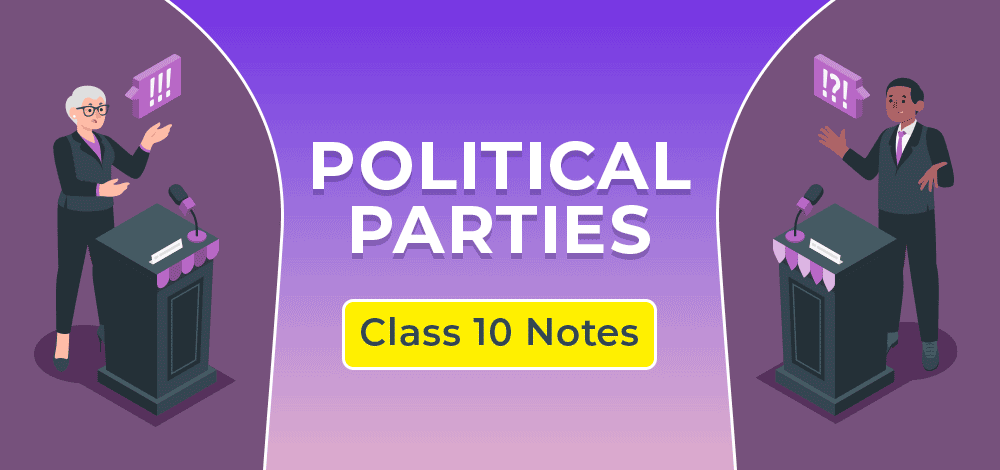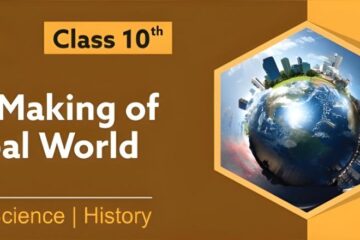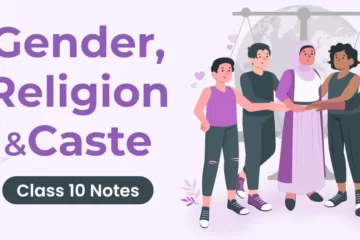DEMOCRATIC POLITICS
Chapter 6 Political Parties
GLOSSARY:
Partisan: A person who is strongly committed to a party, group, or faction, marked by a tendency to take a side and an inability to take a balanced view on an issue.
Ruling Party: A political party that runs the government
One-party system: In some countries, only one party is allowed to control and run the government One-party system
Defection: Changing party allegiance from the party on which a person got elected (to a legislative body) to a different party.
Affidavit: A signed document submitted to an officer, where a person makes a sworn statement regarding her personal information.
POLITICAL PARTIES:
• Political parties are a group of people who come together to contest elections and hold power in govt.
• They agree on certain policies and programs and aim for collective good.
COMPONENTS OF A POLITICAL PARTY:
• The leaders, active members, and followers.
FUNCTION OF POLITICAL PARTIES:
• Parties contest elections which are mainly fought among candidates chosen by different political parties or are independent.
i. India: Top party leaders choose candidates for contesting elections.
ii. USA: Members and supporters of political parties choose independent candidates.
• Parties put forward policies and programs and voters choose from them- a party reduces a vast multitude of opinions into a few basic positions that it supports. A govt. is expected a base its policies on the line taken by the ruling party.
• The party plays a decisive role in making laws for the country and for that, it must be debated and passed in the legislature
• Parties form and run govt as policy decisions are taken by executives that come from political parties.
• Role of opposition: Those parties that lose in the election voice their concerns, views, and opinions about the different policies, decisions, or failures in running the government.
• Shaping public opinion- Parties raise, and highlight issues through themselves or through the lakhs of supporters or members who work directly or through different pressure groups to address the problems of the common citizens of the country.
• Access to government machinery and welfare scheme: Parties provide people access to different schemes launched by the government in power by advertising the schemes implemented by Govt.
NECESSITY OF POLITICAL PARTIES:
• If there are no political parties no one will be able to make promises to the people.
• Though govt. can be formed, their utility (use) will be uncertain.
• Elected representatives will be responsible for their constituency but for the welfare of the nation, no one will be responsible if there aren’t any political parties.
HOW MANY PARTIES SHOULD WE HAVE:
• More than 750 parties are registered with the Election Commission of India.
• Usually, only a handful of parties are effective in the race to win elections and form the govt.
• Different party systems:
i. One-party system-
-In some countries, only one party is allowed to control and run govt. ex. China.
-It is not a democratic opinion. Any democratic system allows at least 2 parties to compete in an election.
ii. Two-party system-
-In some countries, power usually changes between main parties.
-Though several parties exist, only two main parties or wings have the chance of winning a majority of seats. Ex. U.S.A.
iii. Multiple party system-
-Many parties compete for power, and more than 2 parties can come to power. Ex. India
-In the system govt. is formed by various parties coming together in a collection.
-When several parties in a multi-party system join hands to contest elections and use parties. It is called an alliance or a front. For ex. National Democratic Alliance, United progressive alliance, and the Left front.
-The multi-party system often leads to political instability.
-This system allows a variety of interests and opinions to enjoy political representation.
• Party system evolves over a long time, depending on the nature of society, its social and geographical diversity in such a large country is not easily absorbed by 2 or even 3 parties.
NATIONAL POLITICAL PARTIES:
• Democracy that follows a federal system all over the world has 2 kinds of political parties.
i. Parties that are present in only one of the federal units.
ii. Parties that are present in several or all units of the federation.
• National Parties-It is a country-wide party having units in various states. All the units follow the same policies and programs. They are registered by the election commission.
• State Parties-. These parties have their presence in a few states. A party that secures at least six percent of the total votes in the Lok Sabha elections or the Assembly elections in four states and wins at least two seats
• Recognized political parties- Political parties that get the privilege of getting a unique symbol (election symbol) and some other special facilities are recognized by the Election Commission and are known as Recognized Political Parties.
-State parties: A party that secures at least 6% of the total votes in an election to the legislative assembly of a state and wins at least 2 seats is recognized state party.
-National parties: A party that secures at least 6% of the total votes in Lok Sabha elections or Assembly elections in four states and wins at least 4 seats in the Lok Sabha is recognized national party.
• Indian National Congress–
- It is the oldest party founded in 1885 and has experienced many splits.
- Under Jawaharlal Nehru, the party’s will to build a modern secular democratic responsibility in India.
- It was the ruling party till 1977 and then founded from 1980 to 1989.
- It believes in secularism and the welfare of weaker sections and minorities.
- It supports new economic reforms with a human face.
• Bharatiya Janta Party–
- It was founded in 1980 by reviving the erstwhile Bharatiya Jana Sangh and formed by Syama Prasad Mukherjee in 1951
- Drawing Inspiration from India’s culture and values.
- Cultural nationalism (or Hindutva) is an important element in its conception of Indian nationhood and politics.
- It wants full territorial and political integration of Jammu and Kashmir with India a uniform civil code for all people living in the country irrespective of religion and a ban on religious conversion.
- Came to power in 1998 as the leader of the NDA (National Democratic Alliance) including various regional parties.
• Bahujan Samaj Party–
- It was formed in 1984 under the leadership of Kanshi Ram
- It seeks to represent and secure power for Bahujan Samaj which includes the Dalits, Adivasis, OBC, and religious minorities.
- Draws inspiration from the ideas and teaching of Sahu Maharaj, Mahatma Phule, Periyar Ramaswami Naiker, and Bhim Rao Ambedkar.
- Stands for the security interest and welfare of Dalits and oppressed people.
• Communist Party of India–
- Formed in 1925 believes in Marxism-Leninism, secularism, and democracy and is opposed to the forces of secessionism and communalism.
- It split into 2 in 1964, leading to the formation of CPI(M).
• National Congress Party–
- Formed in 1999 following a split in the Congress party.
- Espouses democracy, Gandhian secularism, equity, social justice and federalism
- Wants that high office in govt. be confined to natural-born citizens of the country.
CHALLENGES OF POLITICAL PARTIES
• Importance of state parties:
-The number and strength of state parties made the parliament of India more desirable.
-Since no national parties can form govt. at the center, they are formed to make alliances with state parties.
-This enables the state parties to be the part of central govt.
-This has strengthened democracy and federalism in India.
• Challenges to political parties:
i. Internal democracy within the party- Power is concentrated in the hands of a few people. Parties do not keep membership registers, do not hold organized meetings, and do not conduct internal elections so an ordinary worker does not get sufficient information on what happens inside the party.
ii. Dynastic succession- In many parties, the top position is always controlled by members of one family. An ordinary worker can’t rise to the top of a party.
iii. Growing role of money and muscle power- In the election, parties nominate the candidate who can raise money. In some cases, parties nominate criminals to win elections.
iv. Parties do not offer a meaningful choice to vote- In recent years there has been a decline in the ideological differences between parties. Ex. Labour parties and the Conservative party in Britain are very few. They agree on more fundamental aspects but differ only in details on how policies are to be formed and implemented.
HOW CAN PARTIES BE REFORMED-
• Effects to reform political parties and leaders:
1) The Constitution was amended to prevent elected M.P’s and M.L.A’s from changing parties. This is known as Anti-defection. If any elected representative changes party then he/she will lose the seat in the legislature.
2) It is mandatory for every candidate who contests an election to file an affidavit giving details of his property, and criminal cases pending against him/her.
3) The E.C. passed an order making it necessary for political parties to hold organizational elections within the party and to file income tax returns.
• Suggestion to reform political parties and leaders:
1) A law should be made to regulate the internal affairs of political parties. They should maintain a membership register to follow its constitution.
2) 1/3 seats must be reserved for women.
3) There should be state funding of elections.
• Other ways in which parties can be reformed:
1) People can put pressure on political parties, this can be done through petitions, publicity, and agitations. Ordinary citizens, pressure groups movements, and media can play an important role in this If political parties feel they would lose public support by not taking up reforms, they would become more serious about reforms.
2) Political parties can improve if those who want this join political parties.
3) The quality of democracy depends on the degree of public participation.




